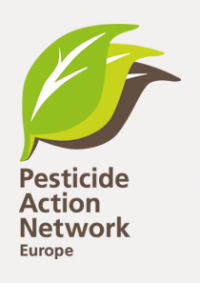Letters

Model Letter for national action against the renewal of glyphosate in EU
26 February 2016
Dear XXX
I am writing to you on behalf of XXX to express our concern about the possible re-approval of the controversial active substance glyphosate in Europe, used in herbicide products, for a period of fifteen years.
Last year, glyphosate was classified by the International Agency for Research on Cancer (IARC) of the World Health Organisation (WHO), as a “probable human carcinogen”, following a thorough analysis performed by 17 independent experts using publicly available studies[1].

Letter to the Standing Committee on Plans Animals Food and Feed following EFSA's opinion on glyphosate
Brussels 1st December 2015
Dear Members of the Standing Committee on Plants, Animals, Food and Feed,
I am writing to you, on the behalf of Pesticides Action Network Europe, in relation to the re-approval of glyphosate-based pesticides for another 10 years in the European Union. The re-approval of glyphosate is of concern, since hundreds of studies available in the academic scientific literature report different types of toxicity following exposure to glyphosate or glyphosate-based products in humans, laboratory animals and wildlife[1].
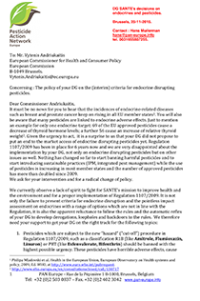
Letter to Commissioner Andriukaitis on EDCs
Dear Commissioner Andriukaitis,
It must be no news for you to hear that the incidences of endocrine-related diseases such as breast and prostate cancer keep on rising in all EU member states[1]. You will also be aware that many pesticides are linked to endocrine adverse effects. Just to mention an example for only one endocrine target: 69 of the EU approved pesticides cause a decrease of thyroid hormone levels; a further 56 cause an increase of relative thyroid weight[2]. Given the urgency to act, it is a surprise to us that your DG did not propose to put an end to the market access of endocrine disrupting pesticides yet. Regulation 1107/2009 has been in place for 6 years now and we are very disappointed about the implementation by your DG, not only on endocrine disrupting pesticides but on other issues as well. Nothing has changed so far to start banning harmful pesticides and to start introducing sustainable practices (IPM, integrated pest management) while the use of pesticides is increasing in most member states and the number of approved pesticides has more than doubled since 2009.
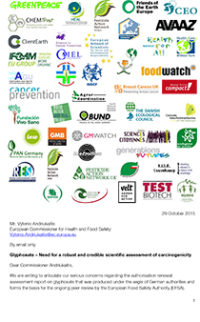
NGO letter to Commissioner Andiukaitis on glyphosate
We are writing to articulate our serious concerns regarding the authorisation renewal assessment report on glyphosate that was produced under the aegis of German authorities and forms the basis for the ongoing peer review by the European Food Safety Authority (EFSA). 2 The WHO’s International Agency for the Research on Cancer (IARC) has classified glyphosate as a “probable carcinogen”.
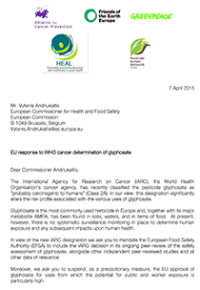
Letter to Commissioner Andriukaitis on the EU response to WHO on Glyphosate
Dear Commissioner Andriukaitis,
The International Agency for Research on Cancer (IARC), the World Health Organisation’s cancer agency, has recently classified the pesticide glyphosate as "probably carcinogenic to humans" (Class 2A). In our view, this designation significantly alters the risk profile associated with the various uses of glyphosate.
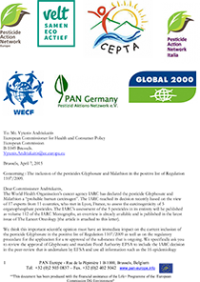
Letter to Commissioner Andriukaitis on Glyphosate
Concerning : The inclusion of the pesticides Glyphosate and Malathion in the positive list of Regulation 1107/2009.
Dear Commissioner Andriukaitis,
The World Health Organisation’s cancer agency IARC has declared the pesticide Glyphosate and Malathion a “probable human carcinogen”. The IARC reached its decision recently based on the view of 17 experts from 11 countries, who met in Lyon, France, to assess the carcinogenicity of 5 organophosphate pesticides. The IARC’s assessment of the 5 pesticides in its entirety will be published as volume 112 of the IARC Monographs, an overview is already available and is published in the latest issue of The Lancet Oncology (the article is attached to this letter).
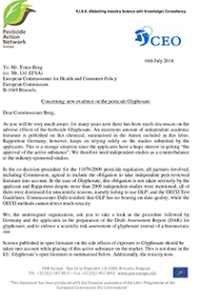
Letter to Commissioner Borg on Glyphosate
Dear Commissioner Borg,
As you will be very much aware, for many years now there has been much discussion on the adverse effects of the herbicide Glyphosate. An enormous amount of independent academic literature is published on this chemical, summarised in the Annex included in this letter. Rapporteur Germany, however, keeps on relying solely on the studies submitted by the applicants. This is a strange situation since the applicants have a huge interest in getting “the approval of the active substance”. We therefore need independent studies as a counterbalance to the industry-sponsored studies.
